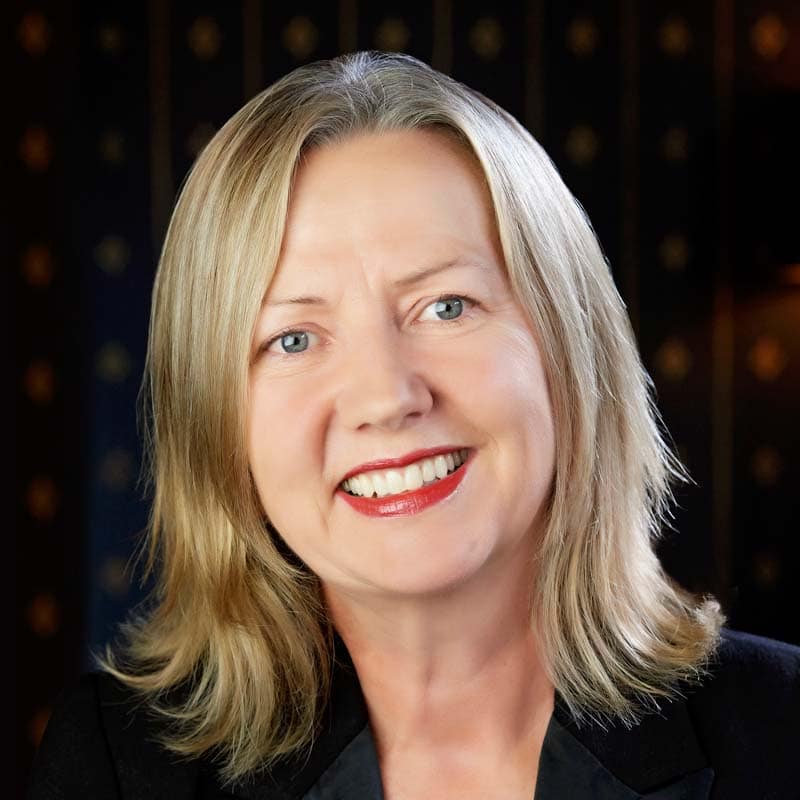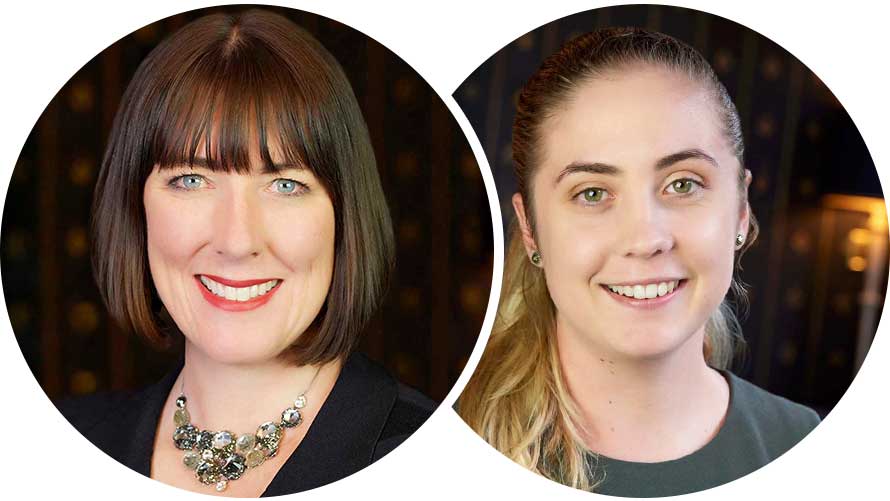Bio-Thera Solutions announced that it has entered into a commercialisation and license agreement with Sandoz to commercialise BAT1706 (proposed bevacizumab biosimilar). Under the agreement, Sandoz will commercialise the product in the US, Europe, Canada and other international markets in exchange for an upfront payment, potential milestone payments and royalties on product sales.
EMA approves Byooviz® (biosimilar ranibizumab)
The EMA approved Samsung Bioepis and Biogen’s Byooviz® (biosimilar ranibizumab) for the treatment of neovascular (wet) age-related macular degeneration, diabetic macular oedema, proliferative diabetic retinopathy, macular edema and choroidal neovascularisation.
Naomi Pearce recognised as a World Leading Patent Strategist by IAM
Pearce IP is proud to announce that Pearce IP’s Founding Principal and Executive Lawyer, Patent and Trade Mark Attorney, Naomi Pearce, has once again been recognised as a World Leading Patent Strategist by IAM Strategy 300. This award identifies the individuals who are leading the way in the development and implementation of IP strategies worldwide.
Special Counsel Jacinta Flattery-O’Brien says:
“We are delighted to recognise the achievements of Pearce IP’s market leading team of lawyers and attorneys, including this latest recognition of Naomi Pearce by IAM Strategy 300, which is very well deserved. Naomi is internationally renowned for her patent and legal work, and leads the Pearce IP team of highly decorated lawyers and attorneys”
Pearce IP and its leaders, are well recognised as leading patent practitioners. Pearce IP is a finalist for ‘Intellectual Property Team of the Year’ in the 2021 Lawyers Weekly Australian Law Awards, and is ranked in IAM Patent 1000 for both legal and attorney patent services. Team members are listed in IAM Patent 1000 and IAM Strategy 300, have been awarded Patent Stars & Notable Practitioner listings by MIP, ranked in Doyles Guide, and listed in WIPR Leaders, 5 Star IP Lawyers, and Australasian Lawyer 5 Star Awards.
Pearce IP is a boutique firm offering intellectual property specialist lawyers, patent attorneys and trade mark attorneys to the pharmaceutical, biopharmaceutical and life sciences industries.

Naomi Pearce
CEO, Executive Lawyer (AU, NZ), Patent & Trade Mark Attorney (AU, NZ)
Naomi is the founder of Pearce IP, and is one of Australia’s leading IP practitioners. Naomi is a market leading, strategic, commercially astute, patent lawyer, patent attorney and trade mark attorney, with over 25 years’ experience, and a background in molecular biology/biochemistry. Ranked in virtually every notable legal directory, highly regarded by peers and clients, with a background in molecular biology, Naomi is renown for her successful and elegant IP/legal strategies.
Among other awards, Naomi is ranked in Chambers, IAM Patent 1000, IAM Strategy 300, is a MIP “Patent Star”, and is recognised as a WIPR Leader for patents and trade marks. Naomi is the 2023 Lawyers Weekly “IP Partner of the Year”, the 2022 Lexology client choice award recipient for Life Sciences, the 2022 Asia Pacific Women in Business Law “Patent Lawyer of the Year” and the 2021 Lawyers Weekly Women in Law SME “Partner of the Year”. Naomi is the founder of Pearce IP, which commenced in 2017 and won 2021 “IP Team of the Year” at the Australian Law Awards.

Jacinta Flattery-O'Brien PhD
Special Counsel, Patent Attorney
Jacinta is a trusted and recognised leader in biotech/pharma patenting, identified as an "IP Star" by the highly regarded Managing Intellectual Property Journal (MIP) for her expertise.
She is a registered patent attorney with 20 years' experience serving clients in the biotechnology, pharmaceutical and biopharmaceutical industries.
Adaptimmune Therapeutics and Genentech enter into strategic collaboration
Adaptimmune Therapeutics announced it has entered into a strategic collaboration and license agreement with Genentech to develop and commercialise allogeneic cell therapies for multiple oncology indications.
Fresenius Kabi releases new data on MSB11456 (proposed biosimilar tocilizumab)
Fresenius Kabi announced that its biosimilar tocilizumab candidate MSB11456 successfully met its primary and secondary endpoints in Ph I trials of both subcutaneous and intravenous formulations.
Pearce IP BioBlast®: w/e 03 September 2021
26 Aug 21 | US | Two former executives of JHL Biotech plead guilty to conspiracy to steal trade secrets and commit wire fraud exceeding $101 million in the US District Court for the Northern District of California. The written plea agreements disclosed that the executives used confidential, proprietary and trade secret information from Genentech to accelerate the timeline and reduce the costs of JHL Biotech’s development and production of Genentech biosimilars.
30 Aug 21 | AU | Australia’s TGA approved Celgene’s Reblozyl® (luspatercept) for the treatment of transfusion-dependent anaemia.
01 Sep 21 | UK | The UK’s NICE recommended UCB Pharma’s Bimzelx® (bimekizumab) as a treatment for plaque psoriasis in adults.
03 Sep 21 | UK | The UK’s NICE recommended Novartis’ Cosentyx® (secukinumab) as a treatment for plaque psoriasis in children aged 6-17 years.
03 Sep 21 | CN | China’s NMPA approved JW Therapeutics’ Relma-cel (relmacabtagene autoleucel) for the treatment of large B-cell lymphoma.
04 Sep 21 | Dr Reddy’s announced that it has sold all of its rights to E7777 (an engineered IL-2-diptheria toxin fusion protein) to Citius Pharmaceuticals. Under the agreement, Dr Reddy’s will receive $40 million upfront, and milestone payments of up to $40 million (related to the cutaneous T-cell lymphoma indication) and $70 million (additional indication approvals).
Australia’s TGA approves Gilead Sciences’ Trodelvy® (sacitizumab)
Australia’s TGA approved Gilead Sciences’ Trodelvy® (sacitizumab) for the treatment of unresectable locally advanced or metastatic triple-negative breast cancer.
Australia’s TGA approves Mylan/Alphapharm’s Abevmy® (biosimilar bevacizumab)
Australia’s TGA approved Mylan/Alphapharm’s Abevmy® (biosimilar bevacizumab) for the treatment of colorectal cancer, breast cancer, non-small cell lung cancer, renal cell cancer, epithelial ovarian, fallopian tube, peritoneal cancer and cervical cancer.
Hetero receives emergency use approval in India for tocilizumab
Hetero announced that it has received emergency use approval from India’s DCGI to market its biosimilar tocilizumab for the treatment of COVID-19.
Dr Reddy’s sells E7777 (an engineered IL-2-diptheria toxin fusion protein) rights to Citius Pharmaceuticals
Dr Reddy’s announced that it has sold all of its rights to E7777 (an engineered IL-2-diptheria toxin fusion protein) to Citius Pharmaceuticals. Under the agreement, Dr Reddy’s will receive $40 million upfront, and milestone payments of up to $40 million (related to the cutaneous T-cell lymphoma indication) and $70 million (additional indication approvals).
China’s NMPA approves JW Therapeutics’ Relma-cel (relmacabtagene autoleucel)
China’s NMPA approved JW Therapeutics’ Relma-cel (relmacabtagene autoleucel) for the treatment of large B-cell lymphoma.
The UK’s NICE recommends Novartis’ Cosentyx® (secukinumab)
The UK’s NICE recommended Novartis’ Cosentyx® (secukinumab) as a treatment for plaque psoriasis in children aged 6-17 years.
Amgen and Hospira ready to settle Neupogen® (filgrastim) dispute
Amgen and Hospira appear ready to settle the ongoing dispute relating to Neupogen® (filgrastim). The matter was due to go to a jury trial on 20 September 2021.
The UK’s NICE recommends UCB Pharma’s Bimzelx® (bimekizumab)
The UK’s NICE recommended UCB Pharma’s Bimzelx® (bimekizumab) as a treatment for plaque psoriasis in adults.
Did pharmaceutical innovation contribute to the AI inventor controversy in Australia?
Australia was recently thrust into the global IP limelight when the Federal Court controversially determined that an artificial intelligence (AI) system, DABUS, can be an inventor of a patent. Reaction to this decision by Australian IP commentators was immediate and ranged from describing the decision as “progressive”, to risking Australia being “left out on our own and looking like chumps”[1]. The arguments that supported recognition of an AI inventor focused on a desire for greater innovation. Whereas, the criticism of the decision is based, at least in part, on a fear that any expansion of patent filings resulting from AI inventors plays into the hands of those who oppose the patent system. Notably, an important aspect of the Court’s decision related to the expanding use of AI in pharmaceutical research.
Pharmaceutical research and AI
We reported previously that Beach J considered, in some detail, the potential of AI to generate innovations in the pharmaceutical industry and expressed a view that not permitting patents on such innovations because a legitimate inventor could not be listed would be the “antithesis” of the newly introduced object clause in the Patents Act, which states that:
The object of this Act is to provide a patent system in Australia that promotes economic wellbeing through technological innovation and the transfer and dissemination of technology. In doing so, the patent system balances over time the interests of producers, owners and users of technology and the public.
Specifically, Beach J refers to a discussion by the Joint Institute for Innovation Policy in its September 2020 final report on “Trends and Developments in Artificial Intelligence: Challenges to the Intellectual Property Rights Framework” prepared for the European Commission. This report prompted Beach J to refer to relevant points at [46] to [54] in relation to how artificial intelligence has been applied to pharmaceutical research including:
- Identifying molecular targets;
- Automated high-throughput processes for detecting clinical candidates;
- Drug repurposing;
- Polypharmacology – drug molecules targeting multiple targets;
- Development and simulation of vaccines, including understanding the three-dimensional structure of proteins;
- Harvesting and utilising information from databases directed to molecular pathways, crystal structures, binding affinities, drug targets, disease relevance, chemical properties and biological activities; and
- Support and predictive modelling in clinical trials.
The Court then, at [55], focuses on “two key drivers for the recent AI advances that could significantly accelerate drug discovery”. These include:
- digitisation of existing scientific knowledge enabling the discovery of new compounds that could target disease targets; and
- recent advances in the field of machine learning, which can assist in managing the complexity of navigating the vast search space for potential drugs.
Beach J concludes that “what this all indicates is that no narrow view should be taken as to the concept of ‘inventor’. And to do so would inhibit innovation not just in the field of computer science but all other scientific fields which may benefit from the output of an artificial intelligence system” (at [56]).
Concluding remarks
The cornerstone of the decision by Beach J, squarely focuses on supporting contemporary and future innovation not just in the computer sciences space but all scientific fields, including the pharmaceutical space. Testament to this is that AI designed drugs have already been created and are entering clinical trials. This decision permitting AI inventors could, therefore, have a significant impact in putting Australia at the forefront of future pharmaceutical patent protection, given that other jurisdictions have rejected AI inventors.
As expected, this controversial decision has been appealed and Pearce IP will keep you promptly advised of developments.
[1] Patentology 1 August 2021, In Becoming the First Country to Recognise Non-Human Inventors, is Australia a Hero of Progress, or a Chump?
AU’s TGA approves Celgene’s Reblozyl® (luspatercept)
Australia’s TGA approved Celgene’s Reblozyl® (luspatercept) for the treatment of transfusion-dependent anaemia.
Pearce IP BioBlast®: w/e 27 August 2021
24 Aug 21 | UCB announced that it has gained EU marketing approval for Bimzelx® (bimekizumab), an IL-17A and IL-17F inhibitor indicated for the treatment of adults with moderate to severe plaque psoriasis.
25 Aug 21 | Cipla and Kemwell Biopharma announced that they have executed a joint venture agreement to develop, manufacture and commercialise biosimilars, with an aim to enter the respiratory biosimilars space.
26 Aug 21 | US | The US Federal Circuit reversed an infringement judgement against Kite Pharma (part of Gilead Pharma) of a patent relating to CAR-T therapies on the basis of lack of written description. The Sloan Kettering Institute for Cancer Research owned patent at issue was licenced exclusively to Juno Therapeutics (now part of BMS). Kite Pharma’s CAR-T therapy is Yescarta (axicabtagene ciloleucel), which competes with Juno’s Breyanzo (lisocabtagene maraleucel).
26 Aug 21 | NZ | NZ’s Pharmac announced that it is considering awarding Principal Supply to Amgevita® (biosimilar adalimumab). Pharmac is seeking feedback on the proposed changes to the funding arrangements.
26 Aug 21 | US | The US District Court for the Northern District of Illinois refused to dismiss AbbVie’s Humira® (adalimumab) infringement suit against Alvotech hf. The court found that AbbVie is not required to sue the US based subsidiary listed on the aBLA form, but could sue Icelandic company Alvotech hf.
27 Aug 21 | US | Bio-Thera Solutions and Hikma Pharmaceuticals announced that they have signed an exclusive commercialisation and license agreement for BAT2206 (proposed ustekinumab biosimilar). Under the agreement, Hikma will gain exclusive commercialisation rights in the US with a first-right-to-negotiate to add Europe (excluding CIS countries) to the agreement.
27 Aug 21 | IN | India’s DCGI granted marketing authorisation for Enzene Bioscience’s biosimilar denosumab.
India’s DCGI approves Enzene’s biosimilar denosumab
India’s DCGI granted marketing authorisation for Enzene Bioscience’s biosimilar denosumab.
Bio-Thera and Hikma sign commercialisation agreement for ustekinumab biosimilar
Bio-Thera Solutions and Hikma Pharmaceuticals announced that they have signed an exclusive commercialisation and license agreement for BAT2206 (proposed ustekinumab biosimilar). Under the agreement, Hikma will gain exclusive commercialisation rights in the US with a first-right-to-negotiate to add Europe (excluding CIS countries) to the agreement.
Two former JHL Biotech executives plead guilty to conspiracy to steal trade secrets and commit wire fraud exceeding $101 million
Two former executives of JHL Biotech plead guilty to conspiracy to steal trade secrets and commit wire fraud exceeding $101 million in the US District Court for the Northern District of California. The written plea agreements disclosed that the executives used confidential, proprietary and trade secret information from Genentech to accelerate the timeline and reduce the costs of JHL Biotech’s development and production of Genentech biosimilars.
US District Court refuses to dismiss AbbVie’s Humira® infringement suit
The US District Court for the Northern District of Illinois refused to dismiss AbbVie’s Humira® (adalimumab) infringement suit against Alvotech hf. The court found that AbbVie is not required to sue the US based subsidiary listed on the aBLA form, but could sue Icelandic company Alvotech hf.
NZ’s Pharmac considering changes to adalimumab funding arrangements
NZ’s Pharmac announced that it is considering awarding Principal Supply to Amgevita® (biosimilar adalimumab). Pharmac is seeking feedback on the proposed changes to the funding arrangements.
US Federal Court reverses CAR-T infringement decision
The US Federal Circuit reversed an infringement judgement against Kite Pharma (part of Gilead Pharma) of a patent relating to CAR-T therapies on the basis of lack of written description. The Sloan Kettering Institute for Cancer Research owned patent at issue was licenced exclusively to Juno Therapeutics (now part of BMS). Kite Pharma’s CAR-T therapy is Yescarta® (axicabtagene ciloleucel), which competes with Juno’s Breyanzo® (lisocabtagene maraleucel).
Cipla and Kemwell announce new biosimilars joint venture
Cipla and Kemwell Biopharma announced that they have executed a joint venture agreement to develop, manufacture and commercialise biosimilars, with an aim to enter the respiratory biosimilars space.
Product specific reports based on extracts from our BioBlast® database
aflibercept | Eylea® | Regeneron
bevacizumab | Avastin® | Roche/Genentech
cetuximab | Erbitux® | BMS/Merck
darbepoetin | Aranesp® | Amgen
denosumab | Prolia®/Xgeva® | Amgen
dupilumab | Dupixent® | Sanofi-Aventis
eculizumab | Soliris® | Alexion
filgrastim (GCSF) | Neupogen® | Amgen
golimumab | Simponi® | Janssen
guselkumab | Tremfya® | Janssen
infliximab | Remicade® | Johnson & Johnson
ixekizumab | Taltz® | Eli Lilly
natalizumab | Tysabri® | Biogen/Elan
omalizumab | Xolair® | Genentech / Novartis
pegfilgrastim | Neulasta® | Amgen
pembrolizumab | Keytruda® | Merck
ranibizumab | Lucentis® | Genentech
regdanvimab | Regkirona® | Celltrion
risankizumab | Skyrizi® | AbbVie
rituximab | Rituxan®/MabThera® | Genentech/Biogen
secukinumab | Cosentyx® | Novartis
tocilizumab | Actemra® | Roche
trastuzumab | Herceptin® | Roche/Genentech
BioBlast® Editor and Contributing Author
Get our Pearce IP Blogs & BioBlast® sent directly to your inbox
Subscribe to our Pearce IP Blogs and BioBlast® to receive our updates via email.

